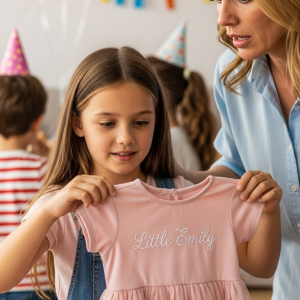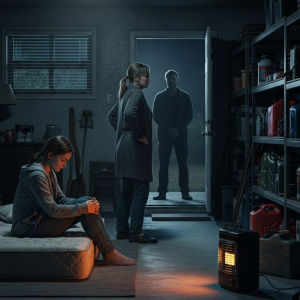My mother and sister called the authorities on my five-year-old daughter. I returned from a work trip a day early, the scent of stale train coffee still clinging to me, and walked into a nightmare. I found my little girl, Charlotte, sobbing in front of two uniformed officers.
Her small body was rigid with a terror I had never seen before, convinced these strange men were there to take her away. My own scream died in my throat, replaced by a cold, sharp focus. I didn’t raise my voice. I acted.
One week later, they were the ones screaming. And I was the one who refused to listen.
My early return wasn’t because of a motherly sixth sense or a desperate need to see my child. It was simpler, more mundane than that. A client meeting in Austin was canceled, leaving a gaping hole in my evening. I looked at my hotel room, a sterile box of beige and brown, and decided against it.
“Why not take the night train?” I thought. “I can surprise Charlotte in the morning, grab her favorite sprinkle donuts on the way.” The thought was a small, bright spot in an otherwise gray business trip.
Of course, there was a knot in my stomach, a familiar acidic churn. But that’s just the price of admission when my mother is involved. It’s the default setting for my entire nervous system. A quiet dread I’ve learned to live with.
The key turned in the lock, quieter than usual. I was moving slowly, bracing myself without knowing what for. You learn to walk on eggshells even when you’re a thousand miles away. The silence in the house was heavy, wrong.
But I never could have braced for this. Cops. Two of them, standing in my living room like monoliths of bad news. One was young, his face a mask of polite concern, scribbling in a notepad. The other was crouched down, speaking in a low, placating tone to my daughter.
My daughter. Charlotte. She was curled into a tight ball on the edge of the couch, her arms pinned to her sides, staring at the floorboards as if they held the answer to a terrible question. She looked like a prisoner awaiting a verdict.
Looming nearby was my mother, Phyllis, her arms crossed, a statue of righteous indignation. My sister, Kendra, was holding her own daughter, Nora, who was putting on a masterful, sniffling performance of fake sobbing into her mom’s shoulder. For a dizzying second, I thought they had the wrong house.
Then, one of the officers looked up. “Good morning,” he said, his voice even. “You must be Mrs. Cross. Mallory, Charlotte’s mother?”
I could only nod, my throat tight. “What in God’s name is going on here?”
He shifted his weight, a subtle, professional move that positioned him slightly between me and Charlotte. It wasn’t aggressive, just… protective. His tone softened. “Everything’s alright, Ma’am. We were just responding to a call. There was a report of a dispute between the children. One… pushed the other.”
His eyes flickered towards my mother. “There was crying. We were told you were out of town, so we’ve been speaking with your mother and sister.”
I looked straight at my mother, the chill in my voice dropping the temperature in the room. “You called the police… on a five-year-old?”
Kendra immediately jumped in, her voice shrill with practiced defense. “She hit Nora! She fell and was crying so hard, weren’t you, sweetie?” Nora, for her part, was now covertly nibbling a cracker, her eyes darting towards Charlotte with a look of pure, childish triumph.
Charlotte hadn’t moved. Her tiny body was trembling. I crossed the room in three strides, sat beside her, and pulled her into my arms. She clung to me, a desperate, silent plea.
“She did not hit her,” my mother corrected, her voice like chipping ice. “She pushed. We tried talking to her, Mallory, but she got mouthy. We thought a quick, official chat might help her understand that this behavior is simply not acceptable.”
The other officer finally stood up, raising a single, incredulous eyebrow. “For a five-year-old, ma’am? We don’t typically conduct behavioral chats with children who aren’t even in kindergarten yet.” He sighed, a sound heavy with paperwork and wasted time.
“We came because we were required to respond,” he continued, “but honestly, this kind of call isn’t what emergency services are for.”
That’s when Charlotte finally looked at me, and her face crumpled. The crying that came out wasn’t loud or dramatic. It was a quiet, broken sound, as if something essential inside her had just given up.
I held her tighter, wrapping my arms around her like a shield. She buried her face in my neck and held on, as if I were the only solid thing left in the world. I rubbed her back and met the officer’s gaze.
“There’s nothing here that warrants further action,” he said gently, his eyes filled with an understanding that my own family lacked. “We’ve documented statements from everyone. There are no signs of harm, the child is shaken but calm now.”
He turned to my mother, his professional demeanor hardening slightly. “Ma’am, we’d recommend handling situations like this privately in the future. Especially,” he added, his voice firm, “without calling in law enforcement unnecessarily.”
“You’re not opening a case?” Kendra demanded, already defensive.
“No, ma’am,” he said. “Let me be perfectly clear. If a report like this happens again, it could be considered a misuse of emergency services. We have real emergencies to attend to. Please don’t waste our time.”
He then looked at Charlotte, and his face softened into a surprising smile. “You’re okay, Charlotte. No one is taking you anywhere. You can go back to playing now, alright? Just remember, sometimes other kids want the same toy. Pushing isn’t how we solve it, but it doesn’t make you a bad person.”
Charlotte just burrowed deeper into my shoulder. The officers let themselves out, the click of the door latch echoing in the sudden silence. The only sound was Nora whining that she wanted to go to the park.
My mother looked at me, her expression expectant, as if I was supposed to apologize for her behavior.
“You have completely lost your minds,” I said, my voice dangerously low. “Calling the police on a child. Over a toy.”
“It wasn’t a toy!” my sister snapped. “It was about aggression! You spoil her, Mallory, and she thinks she can do whatever she wants! Kids like that become problems in school!”
“And grandmothers like you become stories therapists hear for years,” I shot back. “What kind of adult terrifies a child with the police?”
“I didn’t terrify her,” my mother replied, her arms folding tighter. “I simply told her that if she didn’t stop, there would be consequences. That’s not a threat. It’s the truth.”
I felt Charlotte flinch in my arms. “You told her they would take her away. She’s scared of strangers.”
My mother shrugged, a gesture of infuriating dismissal. “Well, perhaps now she’ll think twice.”
I held Charlotte closer. “Yes, now you can think twice. You are never being left alone with her again.”
“Mallory, come on,” Kendra pleaded. “We were just trying to help!”
“You don’t even realize what you did, do you?” I asked, my voice shaking with rage. “She wasn’t fighting over a toy. She was protecting herself—her boundaries. And you showed her that standing up for herself gets her treated like a criminal.”
My mother opened her mouth to argue, but I raised my hand. “No. That’s it. We’re done here.”
That night, as I washed Charlotte’s hair, the scent of her strawberry shampoo filling the small bathroom, I kept replaying the scene. Her terrified face, my mother’s cold eyes, my sister’s pathetic defense. I was helping her into her dragon-print pajamas, reading her a book about a princess who saved herself. It was our usual routine, but I kept stumbling over the words, my brain a frantic buzz of anger and regret.
“Mommy,” she said softly, her voice muffled by my shirt. “Grandma said that if I told you, you’d get upset because you’d be ashamed of me.”
I exhaled, a long, shaky breath, and closed the book. “Okay, sweetie, look at me. First of all, pushing someone isn’t okay, even if they try to take your toy.” Her eyes dropped. “But that doesn’t make you a bad kid. And no, I am not upset with you. And I am definitely, absolutely not ashamed of you.”
She looked up, her big, brown eyes searching my face, as if trying to read the hidden fine print of my disappointment.
“Really, really,” I said, pulling her into a fierce hug. “I am always on your side. Always. If you mess up, we talk about it, just you and me. No strangers showing up. No lectures from Grandma. No guilt trips. Just us, figuring it out. Deal?”
She nodded, finally relaxing against me. I just sat there in the dark, listening to her breathing, knowing I had gotten there just in time. And knowing, with a certainty that chilled me to the bone, that from now on, I wasn’t stepping away. Not even for a minute.
Growing up in that house was an exercise in emotional starvation. My mother, with her perfectly coiffed hair and frosty heart, never yelled. Emotions were beneath her. Her catchphrase, delivered with a cool, dismissive air, was, “Don’t make a scene, Mallory. Behave with dignity.” If I was upset, she never asked, “What happened?” It was always, “And what are you planning to do about it?”
My older sister, Kendra, was her masterpiece. Everything about her was polished: straight A’s, perfect ponytails, a color-coded personality. The one thing she lacked was a spine of her own. She learned to mirror Mom before she could even spell her own name, watching her like she was an instruction manual for how to act, think, and breathe.
I was the “difficult one.” Translation: I had opinions. I spoke at the wrong times. I thought too much and cried when things hurt, which in our house, meant I was weak. My dad existed in the background—soft, warm, and utterly invisible. He loved us, I think, in his own quiet way, but he lived in my mother’s shadow. Sometimes, when she was being particularly unbearable, he’d catch my eye and give me a small wink. That was his version of solidarity. He never stepped in.
When I ran to my room crying, he wouldn’t ask why. He’d just bring me hot cocoa. He was a life raft, not a shield. I left home at nineteen, took night classes, worked during the day, and rented a shoebox apartment with a stunning view of a brick wall. I wanted to be a designer, so I became one.
Now I’m thirty-two, working as a UX designer for a small but steady company. It’s a remote gig with occasional business trips. I’m not rolling in cash, but I make enough. Charlotte came along when I was twenty-seven. Her dad had great shoulders and the emotional range of a kitchen sponge. He seemed solid at first, but then he started flinching whenever she cried at night. Six months later, he was “working late” all the time. A year in, he was gone.
The divorce was quiet. Now he mails a child support check and the occasional birthday card with a wonky dinosaur sketch. Charlotte barely remembers him. So, with this not-perfect but stable life, I let my mom back in. It started after Dad died. Suddenly, out of nowhere, a brain aneurysm. He just didn’t come home from work.
At the funeral, my mother was a statue. No tears. She just looked at me and said, “I suppose it’s all on me now.” We hadn’t really spoken in years, just a few stiff holiday calls. But after that, she started reaching out. One day, she showed up with a supermarket rotisserie chicken. It wasn’t homemade, but it was a peace offering.
I let myself believe she’d changed. Grief changes people, and she was still my mother. I started dropping by with Charlotte. Then I started leaving her there for an hour or two while I ran errands. Kendra lived nearby with her daughter, Nora. They were often at Mom’s. The girls played together. It seemed fine.
Kendra worked part-time as a teacher’s aide, barely minimum wage. She was still with Nora’s dad when he split, moved out of state, and never paid a cent in child support. Kendra leaned on Mom, and Mom… Mom leaned on me.
At first, it was small stuff. An insurance bill here, a leaky water heater there. Then it turned into a monthly ritual. “Can you help with this? Kendra is struggling. She has a child, you understand.” Me too. But I was the one with the steady income, so it was on me. Because we were family.
For a while, I told myself it was worth it. Maybe Charlotte would have what I never had: a warm family, silly Christmas cards, hugs. That meant something. A cousin her age, a grandma who baked cookies… I wanted that for her. I wanted her to feel like she belonged.
But now, watching her sleep, I get it. None of it was real. They never changed. They just played nice for a bit. My mom doesn’t love Charlotte, not really. She’d never say it, but you can see it in her eyes—a constant, low-grade disapproval. Charlotte isn’t a quiet little accessory. She’s loud and bright and messy and fully alive.
My mother can’t stand real. She wants polite, quiet, controllable. Like Kendra. Like Nora, who sits pretty on Grandma’s lap with a bow in her hair, looking like she was manufactured in a box labeled “Ideal Grandchild.”
Kendra knows the game, and she plays it well. She knows who Mom loves more, and she leans into it. Nora is the new favorite. My daughter is the outsider. When Nora shoves someone, it’s a “misunderstanding.” But if Charlotte doesn’t want to share her toy? Red flag. Because, according to Grandma’s handbook, children must learn to share by age three.
I’m done. I’m done pretending this is normal. I will not hand my daughter over to their cold, judgmental little world ever again. They got used to me being the fixer, the one who helps, who pays, who smooths things over. If something went wrong, I was the one to blame.
Not anymore. I’ve picked a side, and I picked my daughter.
The first five days were eerily quiet. No texts, no calls, no passive-aggressive photos of Nora with captions like, “Just imagine how sweet it would be if the girls grew up together.” Charlotte started sleeping through the night again. I started breathing again. For a hot minute, I even believed I could live without that constant, low-grade guilt lodged somewhere under my ribs.
Then, day five hit. I got the email in the morning: “You have successfully canceled your recurring payment of $278 to Kendra Wallace’s loan account.”
I closed my laptop and sighed. Here we go.
Kendra was first. “Hey Mel, did you forget? The payment didn’t go through today. Probably a glitch.”
No, Kendra, not a glitch. Just the end of your free trial of my generosity. I didn’t reply. Silence is a valid response. Three hours later, Mom chimed in. “Mallory, I’m concerned. Are you okay? The utility transfer didn’t come through. We’re having another issue; the water heater is leaking again. I already called someone, but he sent a bill, and I don’t have the funds.”
The utilities. I never paid the bills directly; I just sent a set amount each month per her request. But every time, it came with a story: a broken meter, the gas got shut off, this plumber is more expensive than the last one. It was obvious the stories were decoys. The money was the point. I stopped asking questions. It was easier to throw $180 at it than to play financial detective and end up feeling like a heartless monster.
I didn’t reply to her either. I just canceled the auto-pay on her health insurance, too. Let her call Medicare or hell, for all I cared.
The next day, they decided it was time to bring out the heavy artillery. Kendra showed up in person, with Nora in tow. I was feeding Charlotte star-shaped mac and cheese. Nora stared at her plate like she hadn’t seen food in days.
“We were just nearby,” Kendra said, not making eye contact. “I thought maybe we should talk.” Charlotte pressed herself into my side.
“There’s nothing to talk about,” I said, slicing cucumbers.
“Mel, come on. I don’t have the kind of income you do. I’ve got a kid, and…” she hesitated.
And you’ve got Mom, her chosen one. You’re doing just fine.
“You’re really not going to help anymore?” Kendra asked, her voice cracking.
“Nope. And if you’re hoping to guilt me using your kid, don’t.” She left without saying goodbye.
A few hours later, Mom called. “Is this your final decision?”
“Yep.”
“So you’re just leaving us in a difficult position.”
“No, I’m just no longer sponsoring your lifestyle. You’re grown women. You’ll manage.”
“This is petty. Punishing the whole family over one misunderstanding.”
“That wasn’t a misunderstanding. That was police involvement in a toddler tantrum.”
“You’re exaggerating!”
“And you’re minimizing. It doesn’t work anymore. I’m done.”
“Well,” she said, her voice dripping venom, “don’t be surprised when there are consequences.”
What consequences, exactly? That you’ll boycott Thanksgiving dinner, where I’m already the only one who cooks? Terrifying.
Later that night, Kendra sent one more message. “I’m sorry I came by. We’re just in a really tough spot. I thought you still wanted Nora to have an aunt, for Charlotte to have a cousin. But I guess that doesn’t matter to you.”
Does it matter? It matters that my daughter has people who are safe and kind, who don’t smile while dialing the police because she picked a doll from the wrong bin.
I didn’t answer. I just hugged Charlotte when she asked if she could draw a rainbow on her wall. “As long as it’s in your room,” I said, and she ran off for her markers. I sat there with one half-eaten bowl of stars, a bunch of canceled auto-pays, and this weird, unfamiliar feeling in my chest: relief.
The next day, I went to Charlotte’s preschool a little early and asked to speak with the director. We stepped into her office, and I laid it all out: the grandmother who thinks parenting is a medieval inquisition, the smear campaign in the parent chat, the way my five-year-old had to cling to me like I was a life raft.
“I’m so sorry you’ve been through all that,” she said when I finished. “I hear you. From now on, no one except pre-approved contacts will be allowed near your daughter. Would you like that in writing?”
“Yes, please. And no baby talk, no fake sweet voices, no ‘give auntie a kiss.’ Nothing. Zero access.”
She nodded. “I’ll follow protocol. I’ll also brief the teachers in case either of them shows up at the door.”
“Thank you,” I said. “If any of the other parents ask, feel free to say it’s a safety issue. No details.”
I walked out of there feeling like I’d just scrubbed the entire kitchen after a pot of milk exploded on the stove. It wasn’t perfect, but it was no longer sticky. That night, I filed for a temporary restraining order online. It was as simple as online shopping. Pick your quantity: two. List the reason. Attach screenshots. Estimated delivery: five business days.
They got the papers on Thursday. I know this because for the first time in what felt like forever, there were no texts, no calls, no doorstep performances with wide-eyed children.
Just peace. Real, actual peace.
That evening, Charlotte and I had ice cream for dinner. She chose vanilla; I picked salted caramel because after filing court paperwork, your caramel has to be salted. She was drawing a rainbow on her wall. I let her—in her room, only crayons, no ceiling murals.
“Mama,” she asked, “can I draw a dragon, too? But he has to be nice. He’s going to protect the rainbow.” She ran off to grab her green marker.
I watched her go, then curled up in my chair with a throw blanket and a cup of tea. And for the first time in a long, long time, I wasn’t scared. No calls, no surprises, no guilt bombs, no one knocking, demanding, or gaslighting. They can be mad. They can write long, passive-aggressive monologues in the family group chat. They can tell every distant relative what an ungrateful daughter I am.
I don’t have to be the good one anymore. I just have to be her mother. And I’m on her side. Always.




